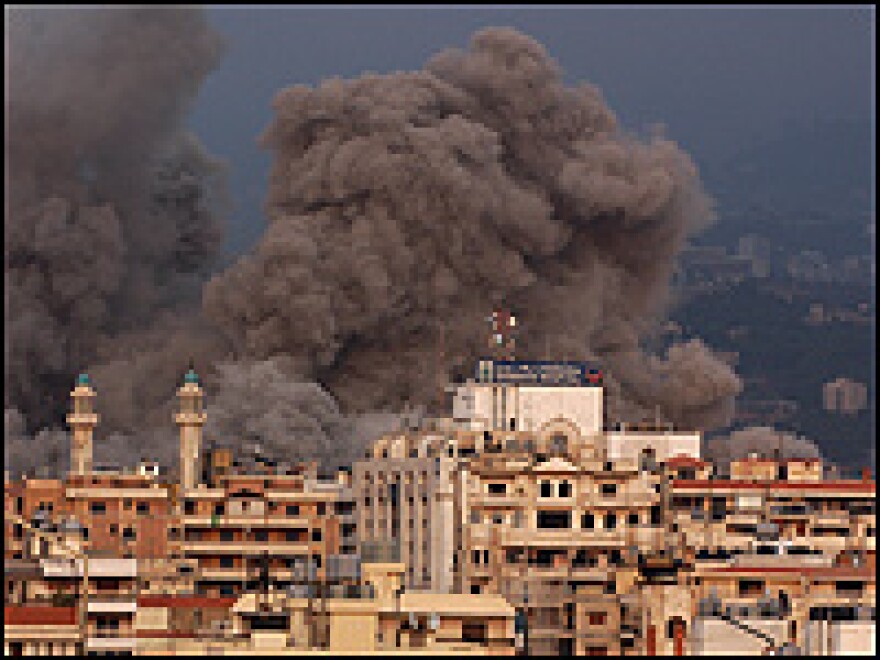
Lebanon's Prime Minister Saturday again appealed to the United Nations to intervene and impose a ceasefire as the Mideast conflict continued to widen on both fronts.
Israeli forces expanded their targets, striking the port city of Tripoli far to the north, and hitting near a Lebanese border crossing into Syria to the east. In a strategy similar to past operations in the Gaza Strip, Israel bombed a series of bridges and roads across Lebanon, dividing the country and stranding citizens desperate to flee. One missile hit a van full of civilians, killing 15 according to local police.
Israeli forces also struck gas stations, and an upscale boardwalk in central Beirut, and continued to pound the south Beirut neighborhood that is Hezbollah's stronghold. Lebanese authorities say the total death toll has reached 100, almost all of them civilians.
Israel appeared to be trying to block the militant group Hezbollah from moving two Israeli soldiers it captured Wednesday. Their abduction touched off this latest escalation, but Israel now says it won't cease fire until it diminishes the power of the Shiite militia Hezbollah.
For its part, Hezbollah continued to fire dozens of rockets into northern Israel, also expanding its targets. At least two modernized Katyusha rockets hit Tiberias, on the Sea of Galilee, the first such attack there since the 1973 Mideast war. Eight people were wounded. Four Israeli civilians, including a child, have been killed this week, and tens of thousands have been largely confined to bomb shelters.
An Israeli intelligence official warned that Hezbollah has long range missiles that could hit Tel Aviv, Israel's largest city.
In his first public speech since the fighting began, Lebanese Prime Minister Fouad Siniora condemned Israel's actions as "collective punishment," and said it has "no moral or legal legitimacy." He also indirectly criticized Hezbollah, saying only the state had the right to make decisions of peace and war. Siniora repeated that he had no prior knowledge of Hezbollah's plan to kidnap the Israeli soldiers.
Siniora pledged to expand Lebanese government authority across the country. The government is a delicate mix of ethnic and religious factions, and is considered too weak to confront Hizbollah despite agreeing to a U.N. resolution to do so. This has left the Shiite militia group operating as a quasi-independent force in the south.
Arab foreign ministers met in Cairo to address the conflict, but ended up fighting amongst themselves when moderate states blamed Hezbollah for the current escalation.
With an air, sea and land blockade against Lebanon, the U.S. government is considering ways to evacuate some 25,000 Americans there. France said it would get its nationals out by ferry. The violence comes at the height of the tourist season. Lebanon had worked hard to revive tourism in recent years, and had spent hundreds of millions rebuilding after a devastating 15 year civil war.
The conflict between Israel and Lebanon is the worst in a decade. In 1996, the Clinton administration engaged in heavy diplomacy to hammer out a ceasefire after 17 days of cross border attacks. So far this week, President Bush has refused to pressure Israel to stop its attacks, but has called on Syria to rein in Hezbollah.
Both Syria and Iran offer financial and military backing to Hezbollah, but they are two countries with which the Bush administration has no official ties. The United States pulled its ambassador out of Syria last year, after that country was believed to have been behind the assassination of former Lebanese Prime Minister Rafik Hariri.
Lebanese themselves are deeply divided about Hezbollah. The group has strong support from the large Shiite community. But the renewed conflict is inflaming resentment on the part of many Christians and Sunni Muslims. They oppose Hezbollah's ideology, and blame it for provoking Israel's devastating military campaign.
Copyright 2023 NPR. To see more, visit https://www.npr.org.


